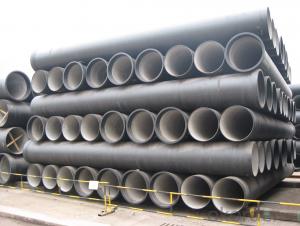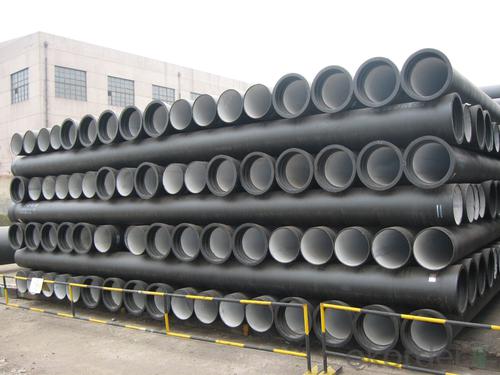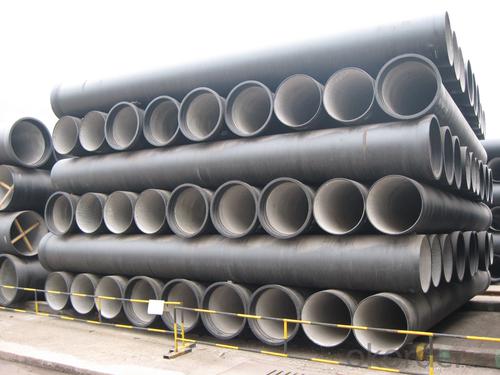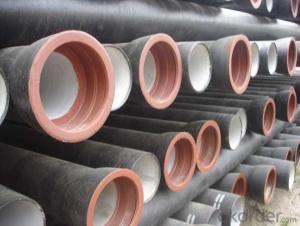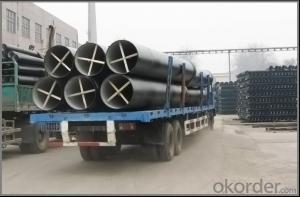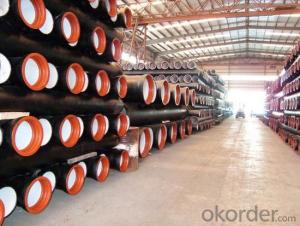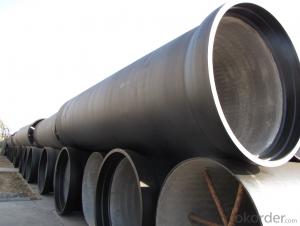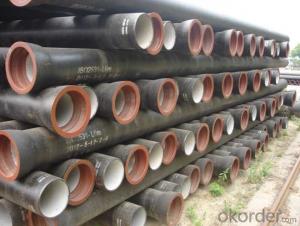EN545 Ductile Iron Pipe DN300
- Loading Port:
- China Main Port
- Payment Terms:
- TT or LC
- Min Order Qty:
- 20 m.t.
- Supply Capability:
- -
OKorder Service Pledge
OKorder Financial Service
You Might Also Like
1) The standard of pipe: ISO2531:1998, EN545:2006,K9 K8
2) Effective length: 6m/5.7m
3) Inner cement line: Portland cement lineas per ISO4179
4) Zinc coating: at least 130g/m2 as per ISO8179
5) Bitumen painting: at least 70μm as per ISO8179
6)With 102% quantity of NBR, SBR, or EPDM ring asper ISO4633
7) DN80-DN1200
8) Highstrength, lighter than grey iron, good corrosion resistance, no furring, smallflow resistance, easy fixing, long life tome about 100 yeas
9)Checked by automatic inspection equipment
10) Composition:
Chemical composition | |||
Chemical composition | Ductile Cast Iron Pipe (%) | Grey iron pipe (%) | Steel pipe (%) |
C | 3.5-4.0 | 3.2-3.8 | 0.1-0.2 |
Si | 1.9-2.6 | 1.4-2.2 | 0.15-0.4 |
Mn | 0.15-0.45 | 0.4-0.6 | 0.3-0.6 |
P | ≤0.06 | ≤0.3 | 0.02-0.03 |
S | ≤0.02 | ≤0.1 | 0.02-0.03 |
Mg | 0.03-0.06 |
|
|
11) Feature:
Mechanical properties | |||
| Ductile Cast Iron Pipe | Grey Iron Pipe | Steel Pipe |
Tensile Strength(Mpa) | ≥420 | 150-260 | ≥400 |
Yield Strength(Mpa) | ≥300 | No Confirmation | No Confirmation |
Bending Strength(Mpa) | ≥590 | 200-360 | ≥400 |
Elongation (%) | ≥10 | Neglected | ≥18 |
Brinell Hardness(HBS) | ≤230 | ≤230 | About 140 |
12) T type mechanical joint
13) Packing: in bulk or container, bundle, paint ,cap,container ,etc.according to customers' requirement.
1) Pipesare bundled together with the steel belt.
2) Wooden pieces are put between the pipes.
- Q: Can ductile iron pipes be used for geothermal systems?
- Yes, ductile iron pipes can be used for geothermal systems. Ductile iron is known for its strength, durability, and corrosion resistance, making it suitable for various applications including geothermal systems. These pipes can handle high temperatures and pressure fluctuations commonly found in geothermal systems. Additionally, ductile iron pipes have excellent thermal conductivity properties, allowing for efficient heat transfer between the geothermal fluid and the surrounding environment. Therefore, ductile iron pipes are a viable option for transporting geothermal fluids in geothermal systems.
- Q: Maximum pipe diameter of ductile iron pipe
- The maximum diameter of ball milling cast iron pipe can be DN3000.. For long pressure pipeline, the performance of ball milling cast iron pipe is better than that of PCCP tube, and the performance is reliable, safe and stable!
- Q: Are ductile iron pipes resistant to root intrusion?
- Although ductile iron pipes typically show resistance to root intrusion, they are not completely impervious. Despite the strength and durability of the material, root intrusion can still happen if there are any cracks, joints, or damaged parts in the pipes. It should be emphasized that root intrusion tends to occur more frequently in older or inadequately maintained pipes, where cracks or gaps may eventually form. However, modern ductile iron pipes are frequently coated with protective layers or linings to decrease the likelihood of root intrusion. Moreover, regular inspection and maintenance can aid in identifying and resolving potential problems before they become more serious.
- Q: What are the meanings of cast iron pipe wall thicknesses LA, A and B respectively?
- Cast iron pipes (Cast, Iron, Pipe), cast cast pipe. Cast iron pipes are used for water supply, drainage and gas transmission lines. They include cast iron pipes and pipe fittings. Labor intensity is small. According to the casting method, it is divided into continuous cast iron pipe and centrifugal cast iron pipe, in which the centrifugal cast iron pipe is divided into sand mould and metal type two kinds. Divided into gray cast iron pipe and nodular cast iron pipe according to different material. According to the interface form, it is divided into flexible interface, flange interface, self anchored interface, rigid interface and so on. Among them, the flexible iron pipes rubber sealing ring; flange interface cast iron pipe flange fixed in the rubber pad, the flange gasket sealing; rigid interface cast iron pipe socket is large, straight pipe is inserted, sealed with cement, this technology has been basically eliminated.
- Q: What is the expected service life of ductile iron pipe?
- The expected service life of ductile iron pipe can vary depending on various factors such as the environment, soil conditions, water quality, and the level of maintenance and corrosion protection measures implemented. However, on average, ductile iron pipe is designed to have a service life of 75 to 100 years. This is due to its superior strength, durability, and resistance to corrosion. Ductile iron pipe is known for its ability to withstand harsh conditions and has been used extensively in water and wastewater systems, industrial applications, and other infrastructure projects. Regular maintenance and proper corrosion protection can further extend the service life of ductile iron pipe, ensuring its continued reliability and performance over many decades.
- Q: Are ductile iron pipes suitable for underground river crossings?
- Indeed, underground river crossings can be facilitated by the use of ductile iron pipes. Ductile iron, being a robust and long-lasting material, can endure the external stresses and burdens encountered in such crossings. With its superb tensile strength, impact resistance, and durability, ductile iron is exceptionally well-suited for underground applications where the pipes may face elevated water pressure, ground displacement, or various environmental influences. Furthermore, ductile iron pipes possess an extended lifespan and are impervious to corrosion, a vital attribute when dealing with water crossings. Their capacity to withstand these circumstances renders them a dependable choice for underground river crossings.
- Q: How does ductile iron pipe perform in areas with high soil corrosivity?
- Due to its inherent corrosion-resistant properties, ductile iron pipe exhibits exceptional performance in areas with high soil corrosivity. The material specifically utilized in ductile iron pipes is engineered to endure harsh soil conditions, including those with elevated levels of corrosive elements. The protective coating is one of the key factors making ductile iron pipe suitable for areas with high soil corrosivity. Most ductile iron pipes are coated with either a layer of cement mortar or a polyethylene sleeve, which acts as a barrier separating the soil from the pipe. This coating serves the dual purpose of preventing direct contact between the soil and the iron, as well as providing an additional layer of defense against corrosion. Moreover, ductile iron possesses inherent corrosion resistance. It contains a higher carbon percentage compared to traditional cast iron, enhancing its strength and durability. The carbon content also generates a protective layer of graphite within the iron matrix, acting as a natural barrier against corrosion. Ductile iron pipes have demonstrated a long service life in areas with high soil corrosivity, often surpassing 100 years. This is due to their ability to withstand corrosion and maintain structural integrity even in harsh environments. Additionally, ductile iron pipes exhibit high resistance to external loads and can endure the stresses associated with high soil corrosivity. In summary, ductile iron pipe is an exceptional choice for areas with high soil corrosivity. Its corrosion-resistant properties, coupled with protective coatings, guarantee the pipe's durability and reliability, even under the most challenging soil conditions.
- Q: Are ductile iron pipes suitable for airport runway drainage?
- Ductile iron pipes are indeed a suitable choice for airport runway drainage. Their exceptional strength and durability enable them to endure heavy loads and extreme conditions commonly encountered in airport operations. Moreover, these pipes possess corrosion resistance, a vital characteristic for drainage systems exposed to diverse chemicals and environmental factors. Additionally, their smooth inner surfaces facilitate efficient water flow and prevent blockages that could disrupt the drainage system. Furthermore, ductile iron pipes are effortless to install and maintain, thus establishing themselves as a dependable option for airport runway drainage systems.
- Q: What is the expected maintenance for ductile iron pipes?
- The expected maintenance for ductile iron pipes typically includes regular inspections for signs of corrosion or damage, cleaning to remove any sediment or debris buildup, and occasional repair or replacement of sections that are worn or compromised.
- Q: Can ductile iron pipes be used for dam construction?
- Yes, ductile iron pipes can be used for dam construction. Ductile iron pipes are known for their durability, strength, and corrosion resistance, making them suitable for various applications including dam construction. These pipes can withstand high pressure and are capable of handling the water flow required for dam operations. Additionally, their flexibility allows for easy installation and maintenance, making them a viable choice for constructing dams.
Send your message to us
EN545 Ductile Iron Pipe DN300
- Loading Port:
- China Main Port
- Payment Terms:
- TT or LC
- Min Order Qty:
- 20 m.t.
- Supply Capability:
- -
OKorder Service Pledge
OKorder Financial Service
Similar products
Hot products
Hot Searches
Related keywords

